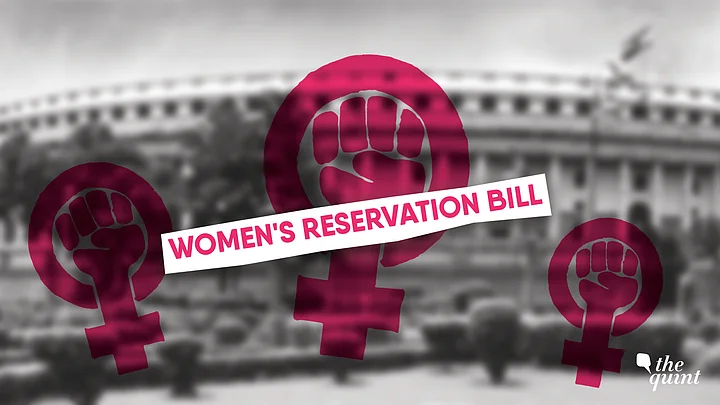It’s International Women’s Day today, or what the Indian Parliament would call “the-one-day-a-handful-of-women-MPs-can-be-cathartic”.
Fun fact: Out of the total 543 MPs in the Lok Sabha, there are just 64 women parliamentarians.
That means that it was mostly male lawmakers who with their expertise debated on the Triple Talaq Bill to decide what is right for Muslim women, and with the same expertise they also thought it right to categorise sanitary pads under items of luxury.
The Women Reservation Bill, which seeks to allot women 33 percent reservation in the Parliament, has been pending for 22 years, now – that makes it almost as old as a run-of-the-mill millennial.
For perspective, look at it like this: the world was running on floppy discs when the bill was tabled, two decades later the world’s changed and now we use cloud storage for data BUT we still don’t have enough representation of women in the Indian Parliament.
Today, as the Rajya Sabha MPs spoke to remind fellow lawmakers of the pending bill for women in the Parliament, obviously more men had delivered speeches than women.
And no question, all these lawmakers are all honourable men standing on the right side, fighting for the right cause, but despite all their well wishes, a lot of them missed the mark by inches.
If nothing else, this is the very reason we need women lawmakers to represent women’s cause and not men who have a surface level understanding of all women they seek to represent.
In their powerful speeches – meant to motivate the Lok Sabha to pass the bill – most of the male parliamentarians (read 99 percent) couldn’t address India’s women beyond the usual matao, beheno, bahu and betiyaan.
When talking about rape, Leader of Opposition Ghulam Nabi Azad with the theatrical perfection of delivery and well-timed pauses talked about how despite the progresses of the country our bahus and betis face the threats of rape.
Okay first of all, it’s 2018, and rape is understood to be a heinous act towards women and not an attack on familial honour anymore. It is problematic for a man to ask other men to raise in arms against the rape of their daughters, mothers and sisters because it unquestionably brings in the ‘honour’ that these domestic roles of women serve to a family name. Azad’s intention is not in question here, it is his archaic understanding of women’s issues and rape.
Next came the poetic appreciation of women for the miracle and beauty of childbirth on the occasion of Women’s Day. This essentially sidelines successful, childless women’s contribution to the other aspects of life other than keeping buns warm in an oven.
Trinamool Congress MP Derek O’Brien, another well-meaning respectable man fighting for women’s issues, started his speech with, “I think men should talk more about women’s issues than women...”. When a male lawmaker’s pro-women speech starts with that, the rest of the speech couldn’t matter to anybody.
The whole idea of a women’s movement is for the men to stand aside and let women take the podium to speak of the subordination they face. The men are supposed to back women in their fight, not speak for them to hog the limelight.
We are talking about women’s issues, and women have PhD-level expertise on gender biases and violence. Can we trust them to be able to talk about their own problems, please?
Subramanian Swamy may have thought it to be very PC (politically correct) to say, “We have been to war twice – once because of Draupadi and the second time because of Sita – this is our tradition”, but if feminists are right (and they are right), Helen didn’t bring down Troy, the Greek and Trojan male egos did.
In the Mahabharata, in fact, Yudhishthira gambled away his wife after he lost his own self to the Kauravas in a game of dice because according to his logic, even a slave has a slave of his own – his wife – an object he can bet on. Rama couldn’t stomach the idea of Sita spending her life in another man’s palace, even though she technically didn’t go there for a vacation, she was kidnapped for god’s sake!
After this statement, Swamy did stress on the importance of passing the reservation bill and urged the Speaker to give the posts of the Cabinet Secretary and Deputy Speaker of the Rajya Sabha to women (God bless his soul).
One could go on with the analysis of men’s speeches on women’s issues to show how alien these issues are to the men who lead this movement.
Anu Aga, a nominated member of the Rajya Sabha preferred to leave out the mythical references and the thespian touches to her speech. In a 5-second-long curt speech that spoke out the hearts of frustrated Indian women, she said, “Stop throwing crumbs at us on this one day of tokenism”. And that is what the country requires from the male parliamentarians.
Choosing to get to the point, DMK MP Kanimozhi said, “Sadly every party supports the bill but we still can’t pass the bill”.
Passing this bill would mean sharing the space of male privilege with women, and to accommodate all the new women in a fixed number of seats, some men wouldn’t be able to get themselves re-elected. Gritty speeches from men amount to nothing because it is the male lawmakers who prevent the passage of the bill.
The house of law needs more than a token representation of women to not only raise issues that women face but also to fight them with first-hand experience.
